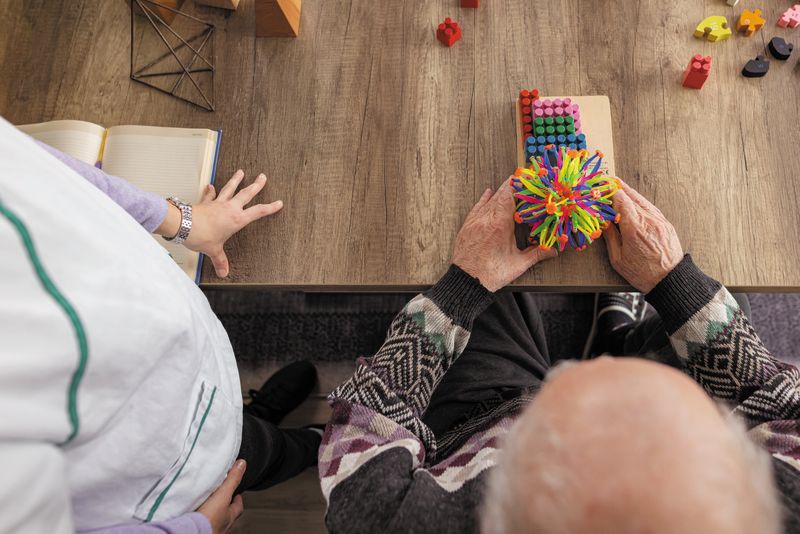 Life was going well for Scott Russell, Thiel ’71: Happily married to his wife, Amy, and the father of two sons, he was at the pinnacle of his career as a director at consulting firm Watson Wyatt. He enjoyed an active lifestyle and close relationships with family and friends.
Life was going well for Scott Russell, Thiel ’71: Happily married to his wife, Amy, and the father of two sons, he was at the pinnacle of his career as a director at consulting firm Watson Wyatt. He enjoyed an active lifestyle and close relationships with family and friends.
But in 2010, he started to notice things that concerned him. “There would be times when I realized there were things I couldn’t remember,” Russell explained. He began to miss meetings and forget details associated with his job. Russell always took great pride in his work, so this was out of character for him.
A series of tests confirmed what Russell feared: He had early onset Alzheimer’s. The disease, a type of dementia that affects memory and behavior, was one Russell was all too familiar with: It ended his father’s life several years prior to his own diagnosis.
Russell acknowledges he went through a period of distancing himself from friends and family after first being diagnosed. He credits his wife with helping him confront his new reality. “After the diagnosis, Amy was the one who reached out to the local Alzheimer’s Association and got me involved in various support groups,” he shared.
While there’s no cure yet for Alzheimer’s, here’s where the story gets even more interesting: Life is still going good for Scott Russell.

Although becoming an advocate wasn’t his original intention, Russell began speaking to groups on behalf of the Connecticut Alzheimer’s Association. Partnering with local educator Dr. Darla Shaw, he started a program in which they visited schools to speak to kids. Hearing about his experience demystified what some of them were seeing family members go through. He even inspired a group of middle schoolers to write a book for younger kids that’s been used to raise funds and build awareness. And the line of stuffed animals he decorates and sells on behalf of the Alzheimer’s Association (named “Alzi Animals”) is loved by children and one of the ways Russell keeps his mind engaged.
Russell has traveled the country giving lectures and speaking at fundraisers and community walks. And after he and Amy served on the National Alzheimer’s Early Stage Advisory Board, Russell was asked to join the board of the National Alzheimer’s Association. It marked the first time the organization had someone living with early onset Alzheimer’s on the board. He was also the first person with the disease to co-chair the annual Alzheimer’s Advocacy Forum, which draws hundreds from all 50 states to Washington, D.C., to lobby Congress for more funding for research. One year, he gave the keynote at the national convention of Tau Kappa Epsilon, the fraternity of former President Ronald Reagan (who also had Alzheimer’s).
With support from a major research institute, Russell and a former colleague are now developing a potentially groundbreaking survey examining the impact of diet, exercise and other lifestyle factors on the development of dementia and Alzheimer’s in particular.
Russell remains incredibly upbeat and is proud of the work he’s done to increase awareness about Alzheimer’s. He serves on several nonprofit boards and volunteers with faith-based organizations and other local groups to build ramps for disabled members of the community.
While he takes medication to slow the progression of the disease, he said having Amy’s support, maintaining a healthy diet and staying active (he continues to play with a soccer league) have all played a role in helping him retain memories and a level of alertness that’s unusual for someone who was diagnosed nearly 15 years ago. Spending time with good friends and chapter brothers like Barry Stamm, M.D., ’70, and John Zawacki, ’71, and their wives has also provided a community of support.
Russell’s quick to say his journey hasn’t been linear; while experiencing declines in some areas, he’s remained steady in others, producing a zigzag path that might be surprising to anyone who hasn’t experienced dementia or had a loved one with the disorder. He’s also had medical issues arise, including a recent heart surgery.
Still, Russell continues to look on the upside. “One of the biggest impacts this has had is to make me realize how fragile and precious life is.”
Birth of a SigEp Tradition
While his memories aren’t as sharp as they once were, being involved in SigEp is something Scott Russell looks back on with immense fondness. He not only appreciates the friends he made, but also how being a member of the Pennsylvania Nu chapter shaped his personal development as an undergraduate. He credits much of that development to his good friend and mentor, Pete Steffens, Thiel ’70, who Russell still talks to almost daily.
“One of the mantras of SigEp was to be involved on campus in a positive way,” Russell said. “That’s how I got involved in student government and became senior class president. The Fraternity wanted you to expand your horizons and encouraged you to do that.”
He can also lay claim to a role in starting a longstanding Fraternity tradition. One year while attending SigEp’s Grand Chapter Conclave, Russell and others at his table began kidding around about the colorful sports jacket Conrad Eberstein, Pennsylvania ’65, was wearing. At one point, Russell joked that the unusual jacket should be auctioned off.
To the group’s surprise, Eberstein was game. Since then, the jacket has been auctioned at major SigEp events, including Conclave’s closing banquet, the Alumni Awards Dinner. The proceeds go to the SigEp Educational Foundation, and hundreds of thousands have been raised to support undergraduate brothers since the tradition started.









Leave a Reply